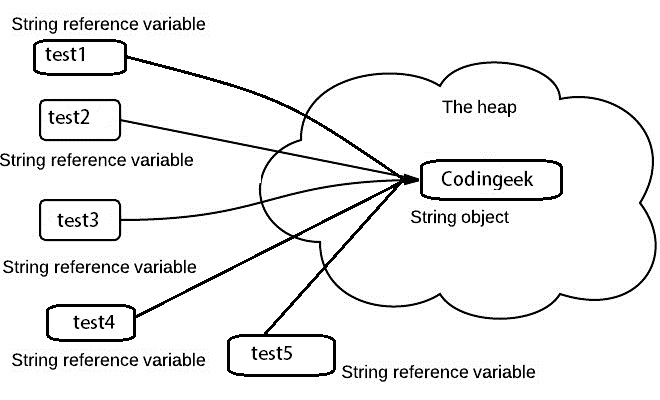Why Are Strings Immutable in Java? Enhancing Code Dependability
Why Are Strings Immutable in Java? Enhancing Code Dependability
Blog Article
Exploring the Advantages of Unalterable Strings in Modern Programming Paradigms
In the realm of modern programming standards, the idea of immutable strings stands as a foundation of robust software development. By embracing immutable strings, programmers can ensure improved data stability, enhanced thread security, simplified debugging procedures, increased security procedures, and efficient performance optimization.
Boosted Data Integrity

By stopping the alteration of string objects, immutability eliminates the threat of unintentional adjustments to the data they hold. This not only improves the security of the details but likewise enhances the integrity of the code that counts on these strings.
Immutability likewise sustains more secure multithreading atmospheres, as concurrent accessibility to immutable strings does not pose the danger of information corruption with synchronised modifications. This property simplifies the procedure of dealing with strings in identical shows scenarios.
Fundamentally, immutability functions as a safety shield around the information stored within strings, enhancing their integrity by making certain that once specified, their values remain unchanged throughout the program's implementation.

Enhanced Thread Safety And Security
Immutable strings boost the thread security of programs by ensuring that as soon as a string object is produced, its value can not be changed. This property eliminates the danger of simultaneous strings attempting to change the same string simultaneously, which might lead to data corruption or irregular states in the program - Why are strings immutable in Java?. In a multi-threaded atmosphere, where numerous strings access and adjust data all at once, the immutability of strings supplies a level of security by assuring that the information continues to be the same throughout its lifecycle
Streamlined Debugging Procedures
Given the enhanced thread safety and security promoted by unalterable strings, a significant advantage arises in the realm of streamlined debugging procedures. Unalterable strings, once developed, can not be altered, making it much easier to map the circulation of data and recognize the resource of pests in a program. This immutability makes sure that strings stay regular throughout the implementation of the program, decreasing the probability of unanticipated changes that could cause mistakes.
When debugging with mutable strings, developers commonly encounter issues where a string's value is changed inadvertently, making it challenging to pinpoint the origin of an insect. Nonetheless, with unalterable strings, the information continues to be unmodified, allowing designers to concentrate on analyzing the real logic of the code instead than locating where and when a string was customized improperly.
In addition, unalterable strings streamline the debugging procedure by making it possible for much easier recreation of pests. Since unalterable strings do not change state, designers can recreate and study bugs better, bring about quicker identification and resolution of concerns within great site the codebase. you could check here This structured debugging process ultimately adds to higher software application quality and boosted general development effectiveness.

Enhanced Safety Actions
Enhancing data protection and strengthening system stability, the usage of immutable strings in software program applications adds substantially to enhanced security steps. Unalterable strings, when created, can not be customized, offering an essential protection versus harmful meddling or unapproved access. By ensuring that delicate data kept in strings stays unchanged throughout the program's implementation, the danger of information violations or injection attacks is greatly minimized. Why are strings immutable in Java?. Unalterable strings also play an essential duty in stopping common protection susceptabilities such as barrier overflows and SQL shot assaults, as efforts to control string data at runtime are inherently restricted.
In addition, the immutability of strings enhances the predictability of program habits, making it much easier to confirm inputs and stop unexpected adjustments that could endanger security. This predictability simplifies the procedure of bookkeeping and confirming code, enabling programmers to identify prospective security loopholes more effectively. In general, integrating unalterable strings into software advancement methods not only boosts the robustness and reliability of applications however also reinforces their strength versus safety and security risks.
Reliable Performance Optimization
When dealing with mutable strings, procedures like concatenation or substring production typically result in the development of brand-new string things, leading to memory overhead and raised handling time. By allowing strings to continue to be stable and continuous, unalterable strings help with better memory administration and caching possibilities, eventually boosting the general efficiency of the software.
Since unalterable strings can not be modified once developed, they can be shared across threads without the risk of unforeseen adjustments, lowering the need for synchronization devices and boosting concurrency. Immutable strings simplify debugging procedures as developers can trust that a string's worth will certainly continue to be constant throughout the program's implementation, removing prospective errors triggered by mutable state changes.
Conclusion
To conclude, the benefits of utilizing immutable strings in contemporary programs standards can not be overstated. Improved information integrity, enhanced thread safety, streamlined debugging procedures, boosted protection actions, and reliable efficiency optimization all add to the general effectiveness of programming tasks. By integrating immutable strings into programming techniques, developers can gain from a more trusted and robust codebase.
Immutability, an essential feature click to read more of strings in programming languages such as Java and Python, guarantees that when a string item is created, it can not be altered or modified.Unalterable strings improve the thread safety of programs by making certain that when a string object is developed, its value can not be customized. Unalterable strings likewise play an important duty in preventing usual safety and security susceptabilities such as buffer overflows and SQL injection assaults, as attempts to adjust string data at runtime are inherently restricted.
By allowing strings to remain constant and stable, immutable strings facilitate far better memory administration and caching opportunities, inevitably improving the overall efficiency of the software.
Immutable strings streamline debugging processes as developers can trust that a string's worth will certainly continue to be constant throughout the program's execution, getting rid of prospective mistakes caused by mutable state changes.
Report this page